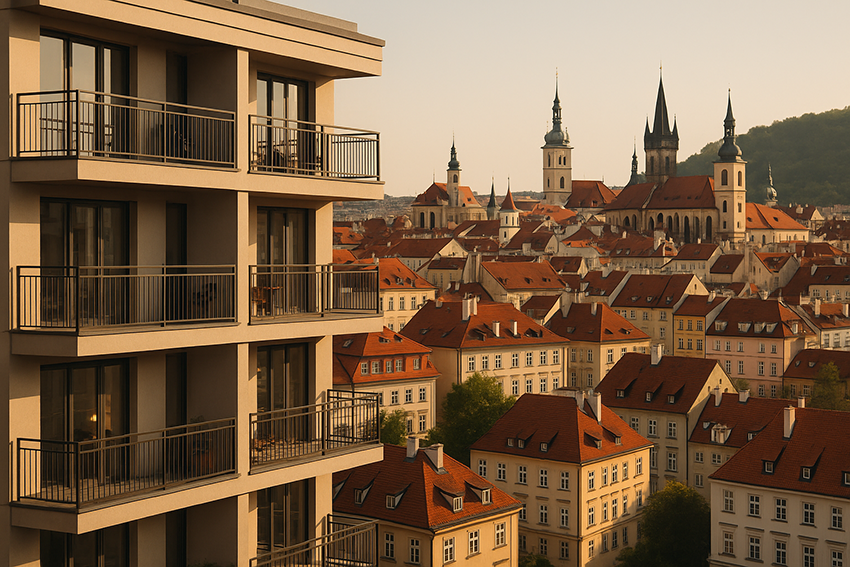Deloitte: Prague among Europe’s least affordable cities for new apartments
CIJ EUROPE has examined Deloitte’s latest Property Index 2025 together with recent data from the Czech Statistical Office, developers’ reports, and independent mortgage and rental trackers to provide a clearer picture of housing affordability in Prague and across Europe.
Prague remains one of the most challenging capitals in which to buy a new apartment. Deloitte’s 2025 ranking places the Czech capital as the second least affordable city in Europe after Amsterdam. On average, buyers would need 13.5 gross annual salaries to purchase a 70-square-metre new-build flat. This is a slight improvement on the 14.3 years of income required in last year’s edition of the index, but it still leaves Prague near the bottom of the European table. Athens follows closely behind, while Bratislava also ranks among the least affordable.
Despite this relative improvement in the ranking, affordability pressures remain intense. Prices of new apartments in Prague have risen steadily: Deloitte’s Develop Index shows that average asking prices in the second quarter of 2025 reached CZK 169,300 per square metre, a 1.9 percent increase from the previous quarter. Data from developers Central Group, Skanska Residential and Trigema place the average at more than CZK 170,000 per square metre in Q2, with year-on-year growth of 8.8 percent. Transaction volumes confirm demand resilience, as developers sold 4,300 new flats in the first half of 2025, 23 percent more than a year earlier and the second-best half-year result in 15 years.
Incomes are climbing, but not fast enough to close the gap. The Czech Statistical Office reports that the average gross monthly wage in Prague was CZK 62,472 in the first quarter of 2025. With prices still rising faster than salaries, the multiple of income needed to buy remains historically high, particularly for first-time buyers and middle-income households. Deloitte partner Miroslav Linhart noted that the structural imbalance between wage growth and housing prices continues to undermine affordability and is unlikely to be corrected without major supply-side changes.
Rental pressures add to the overall strain. Average asking rents in Prague have climbed to around CZK 438 per square metre in early 2025, compared with about CZK 395 at the end of 2023. Mortgage costs, meanwhile, remain elevated compared with Western Europe, although they have eased from their 2023 peaks. According to CBA Hypomonitor, the realised average interest rate on new mortgages fell to 4.53 percent in July 2025. Data from the Swiss Life Hypoindex show headline offer rates hovering near 5 percent through the summer, helped by the Czech National Bank’s decision to cut its key rate to 3.50 percent in May.
On a European scale, Prague sits within a broader affordability crisis in major capitals. Amsterdam leads the ranking with 15.3 annual gross salaries required to buy a new apartment, while Athens comes in just behind Prague. By contrast, cities such as Turin in Italy or Odense in Denmark are at the other end of the spectrum, where households need less than five years of income to purchase a flat. In the rental market, Luxembourg City remains Europe’s most expensive at about €43.5 per square metre per month, followed by Paris at roughly €31–32 and Dublin close behind, underlining the severe housing cost pressures in Europe’s economic centres.
Housing supply is the critical differentiator. Euroconstruct data show that the Czech Republic began just 3.34 new housing projects per 1,000 inhabitants in 2024, placing it in the lower half of the European ranking. Ireland, Turkey and Israel led in new construction relative to population, while Albania, Italy and the UK were at the bottom. Analysts point out that countries building more homes per capita, such as Ireland, are better positioned to narrow the gap between incomes and housing costs, while countries with restricted new supply remain under persistent affordability stress.
The latest findings confirm Prague’s status as one of the hardest places in Europe to buy a new apartment. Prices remain on an upward trajectory, rental costs are rising, and mortgage rates, though easing, continue to weigh on affordability. Without a significant increase in housing supply, the gap between wages and property values is expected to remain entrenched.
Source: Deloitte and comps.









